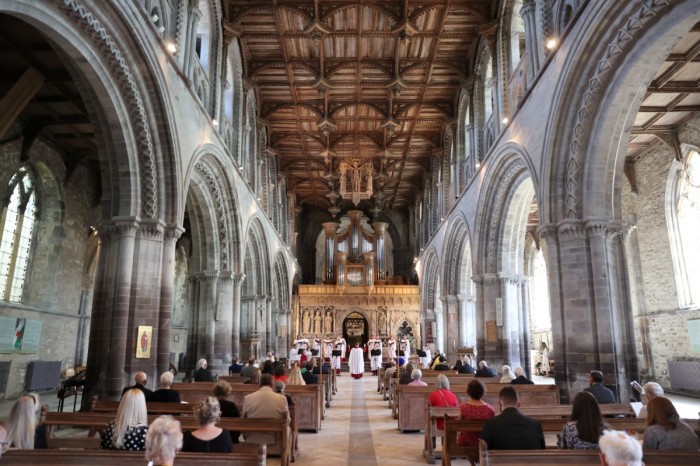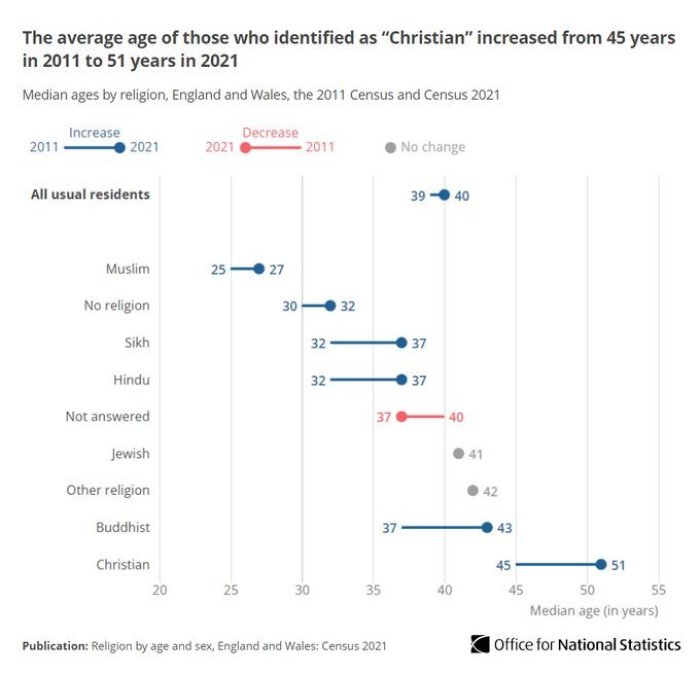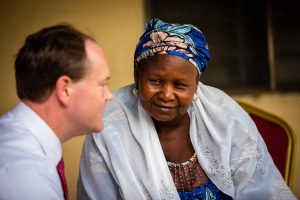Average age of people in England, Wales identifying as Christian climbs above 50: census
Over half of all Welsh age 45 and younger have no religious identity

The average age of people who identify as Christian in England and Wales has topped 50, as most younger adults now identify as non-religious, according to new census data.
In 2021, the median age of those identifying as Christian was 51, compared with 45 just a decade ago, according to a breakdown of religion by age and sex in England and Wales from the Office of National Statistics.
That median age marked the oldest average age among most religious groups among these two U.K. countries.
While in 2011 over two in 10 who identified as Christian were 65 or older, that number is now three in 10, while the percentage of those ages 21-25 who identify as Christian has declined from 5.1% to 3.9%.
People who identify as Muslim, meanwhile, had the youngest average age at 27, up slightly from 25 in 2011.
Other religious groups saw their averages slightly increase, including Hindus and Sikhs, whose average age jumped from 32 to 37. Those identifying as Jewish saw their average age unchanged at 41 years old.
As for the “nones,” those who say they do not hold any religious beliefs, their average age also increased from 30 to 32, while over half of the non-religious were in the 22 to 30 age range, with 27-year-olds holding the highest proportion (53%).
“Many factors can cause changes in the size of religious groups, including changing age structure, people relocating for work or education, and differences in the way individuals chose to self-identify (or how children's religious affiliation was reported) between censuses,” the report stated.
There were significant differences between respondents from England and Wales: while the number of people who say they have no religion was more than half of all people up to age 45 in Wales, only those ages 23 to 30 had roughly the same percentage in England.
Wales had an older peak age for those who identify a Christian — age 99 at over 82% — while the proportion of those who identify as Christian in England peaked at 89 years old at nearly 79%.

Among other religious groups, at least one in 10 people aged 18 or younger in England identified as Muslim, including data that recorded the religious identity of 1-year-old babies at nearly 12%, according to ONS.
As part of the census effort, secular atheist group Humanists UK launched a campaign urging people “who don’t believe in or practice” any religion to identify as “no religion.”
Asserting that “millions of non-religious people” accurately identify as religious in the census due to the “biased way in which the question is asked,” Humanists UK warned that exaggerated religious data could be used for the purposes of “unfair religious discrimination in our society.”
As examples, the organization cited a number of what it characterized as adverse outcomes, including more “faith schools,” the enforcement of what it called “compulsory Christian worship in schools,” and using public service contractors from religious organizations “who can discriminate against non-religious or LGBT service users.”
The campaign did not cite any specific data or examples to support its claims.
According to Humanists UK, if the non-religious were counted more accurately by the census, it could result in “replacing compulsory worship with inclusive assemblies,” “swapping faith-based religious instruction in schools for inclusive education about all the different beliefs and values,” and taking a “second look” at allowing religious officials to vote in Parliament.
“The only countries that do this are the U.K. and Iran!” the website states.
For England and Wales, the trend toward godlessness has been fairly steady since 2016, when a data analysis found those without a religion outnumbered Christians in England and Wales for the first time ever.
Data collected through British Social Attitudes surveys over three decades showed when looking at England and Wales specifically, as many as 48.5% of the population stated they had no religion back in 2014. Those who belonged to Christian denominations, on the other hand, made up only 43.8% of the share.
Last November, Christians became a minority in the U.K. for the first time since the first census was taken in 1801.
Data released by the U.K.’s Office for National Statistics showed fewer than half of the population identified as “Christian,” while the share of individuals who said they have no religion continued to increase along with those who identified with other religions.
Ian M. Giatti is a reporter for The Christian Post. He can be reached at: ian.giatti@christianpost.com.





























